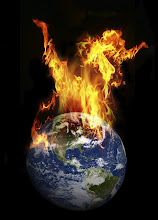Kleppel also made several interesting points about how the food that Americans consume today is simply not safe. He emphasized on how if we take initiative to buy food more locally we could ultimately help ourselves. A lot of the meat we eat is produced from abused animals. Animals like chickens and pigs are kept in such close quarters that the chickens have their beaks cut off so they wont peck each other and the pigs have their tails cut off so the other pigs won't chew them. I don't know about you but this is certainly not the kind of animal I want to be consuming. In order for an animal like a chicken to be considered "free range" they only have to be let outside for two of eight weeks. How can that possible be considered "free range chicken"? When I hear the word free range I think of something that is literally able to freely roam around in an open area at all times, not for just two weeks.
Throughout this course we continuously see this repeating theme that people say one thing but do another. Just like the Enron employees. They made it seem like their company was a great and wealthy thing when really it was crumbling to its ultimate fall. This case is no different. Its hard to know who to trust and how to know who is really telling the truth. Professor Kleppel discussed how if we get our food locally we really can tell what kind of conditions our food is coming from. When a producer denies you the rights to look at their production you know something just is not right. The average slaughter house has uneducated, illegal immigrants working to slaughter their animals. If they mess up the intestines of the animals go into a separate pile and become what we know as chopped meat. This chopped meat from these grain fed cattle causes an increase in the amount of E. coli 015:H7. This is simply wrong. The food we eat should be save and keep us healthy, not make us sick. Personally, I would like to know that the food I eat is coming from someone who knows what their doing and treats their animals in the best way possible. This does not include keeping them in such close corridors that they can't even lay down, or pumping them full of antibiotics and hormones that they don't even need.
Professor Kleppel, to me, really is an inspirational person. He along with his wife live on a farm called the Longfield Way. Here they use solar panels and older technology to reduce energy cost and used. The farm captures two tons more carbon than what they are putting out per animal. They also raise their own animals, the way they should be raised, that they later eat and also bake a lot of their own foods such as bread. By doing this they really are "saving themselves". They are saving money, living a great lifestyle, and being healthy while doing it. A lot of this class has been spent talking about what "could" be done to help with the environment and the earth. Yet to see people actually taking action and doing this really is a great thing.
Currently we are living in what is known as the "sixth great extinction period". We are burning rain forests, poisoning crops, building huge suburbs, warming the climate, and ultimately killing off species at an extremely high rate. I think we should all use Professor Kleppel's ways as an example of how you don't need all the material things in the world to have a great life. You can be happy and most importantly healthy by actually taking a step back and changing just some of your ways. If everyone makes just the slightest effort, we really can work on hopefully saving the only planet we have. As professor Kleppel stated "Be the Shepard".
- Before you can save the world, you have to save yourself
Professor Gary Kleppel, November 2, 2009

No comments:
Post a Comment